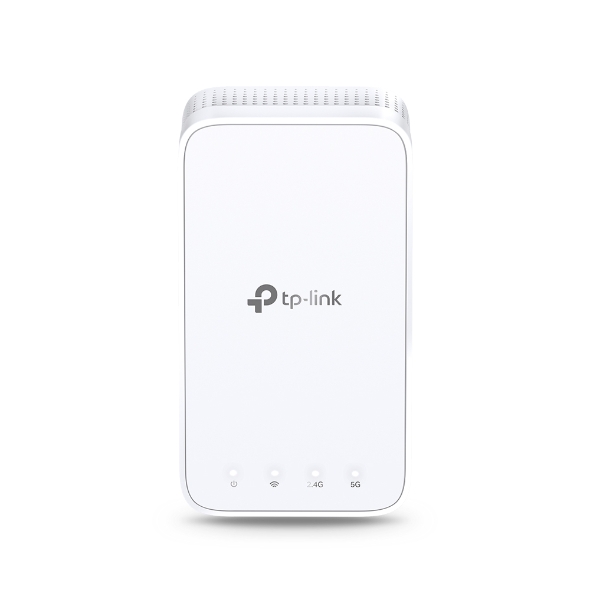(Part – RE330) AC1200 Mesh Wi-Fi Extender – Range Extenders – Networking – TP-Link
TP-Link’s RE330 comes with next generation 802.11AC Wi-Fi technology, 3 times faster than the standard 802.11n speeds.
- Eliminate weak signal areas with whole home WiFi coverage.
- 2.4 GHz (300 Mbps) and 5 GHz (867 Mbps) dual-band WiFi connection ensures more stable wireless experience.†
- Creates a Mesh network by connecting to a TP-Link OneMesh™ router for seamless whole-home coverage.‡
- Adaptive Path Selection – connects to the fastest connection path to the router automatically and runs at top-speed.
- AP Mode – create a new Wi-Fi access point to enhance your wired network with Wi-Fi capability.
- Smart signal indicator helps to find the best location for optimal Wi-Fi coverage by showing the signal strength.
- Push the WPS button to easily connect to the router and you can uniformly manage from the Tether app or Web UI.
- Works with any Wi-Fi router or wireless access point.§
Call for Price
| Working Modes | Range Extender/Access Point |
|---|---|
| Standards and Protocols | IEEE 802.11a/n/ac 5 GHz, IEEE 802.11b/g/n 2.4 GHz |
|---|---|
| Interface | 1 x 10/100M Ethernet Port (RJ45) |
| Ports | 1 x 10/100Mbps Ethernet Port (RJ45) |
| Button | WPS Button, Reset Button |
| Input Power | 100-240V~50/60Hz |
| Power Consumption | 9.5W |
| Dimensions ( W x D x H ) | 2.7×1.4×4.9 in. (69.5×35.0×124.1 mm) |
| Antenna | 2 Internal Antennas |
| Wireless Standards | IEEE 802.11a/n/ac 5GHz, IEEE 802.11b/g/n 2.4GHz |
|---|---|
| Frequency | 2.4GHz & 5GHz(11ac) |
| Signal Rate | 300 Mbps at 2.4 GHz, 867 Mbps at 5 GHz |
| Working Modes | Range Extender/Access Point |
| Reception Sensitivity | 5 GHz: 11a 6Mbps: -94dBm, 11a 54Mbps: -77dBm 11ac HT20 MCS0: -94dBm, 11ac HT20 MCS8: -71dBm 11ac HT40 MCS0: -92dBm, 11ac HT40 MCS9: -66dBm 11ac HT80 MCS0: -87dBm, 11ac HT80 MCS9: -62dBm 2.4 GHz: 11g 54Mbps: -78dBm, 11n HT20 MCS7: -76dBm 11n HT40 MCS7: -74dBm |
| Wireless Modes | Range Extender/Access Point |
| Wireless Functions | Enable/Disable Wireless Radio, Wireless Statistics |
| Wireless Security | 64/128-bit WEP, WPA-PSK/WPA2-PSK encryptions |
| Transmission Power | 2.4 GHz ≤20dBm, 5 GHz ≤30dBm |
| Certification | FCC, RoHS |
|---|---|
| Package Contents | Wi-Fi Range Extender RE330 Quick Installation Guide |
| System Requirements | Microsoft Windows 98SE, NT, 2000, XP, Vista™ or Windows 7, 8, 8.1, 10, MAC OS, NetWare, UNIX or Linux Internet Explorer 11, Firefox 12.0, Chrome 20.0, Safari 4.0, or other Java-enabled browser |
| Environment | Operating Temperature: 0℃~40℃ (32℉ ~104℉) Storage Temperature: -40℃~70℃ (-40℉ ~158℉) Operating Humidity: 10%~90% non-condensing Storage Humidity: 5%~90% non-condensing |
† Maximum wireless signal rates are the physical rates derived from IEEE Standard 802.11 specifications. Actual wireless data throughput and wireless coverage are not guaranteed and will vary as a result of 1) environmental factors, including building materials, physical objects, and obstacles, 2) network conditions, including local interference, volume and density of traffic, product location, network complexity, and network overhead, and 3) client limitations, including rated performance, location, connection quality, and client condition.
‡ Smart Roaming is designed for devices that support the 802.11k/v standard.
§ The product may not be compatible with routers or gateways with firmware that has been altered, is based on open source programs, or is non-standard or outdated.
Actual network speed may be limited by the rate of the product’s Ethernet WAN or LAN port, the rate supported by the network cable, Internet service provider factors and other environmental conditions.







